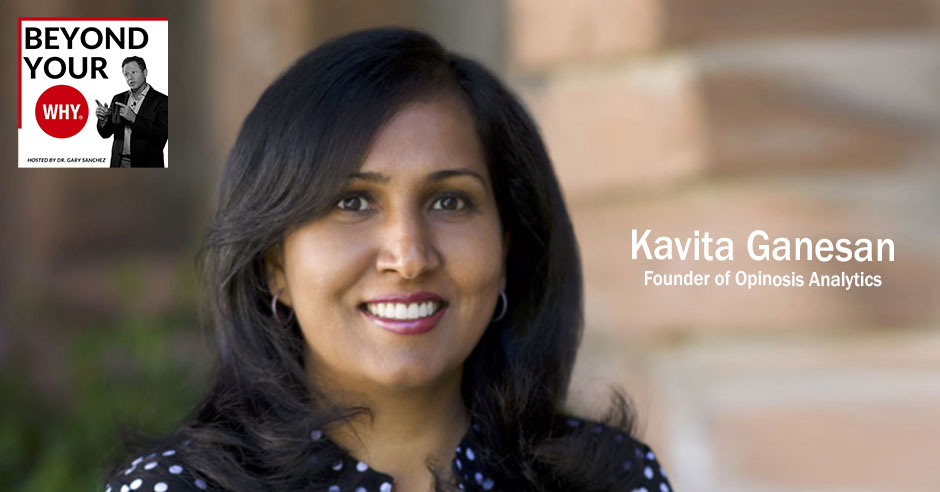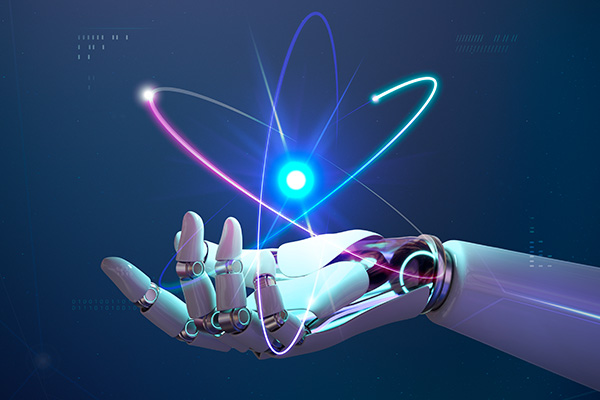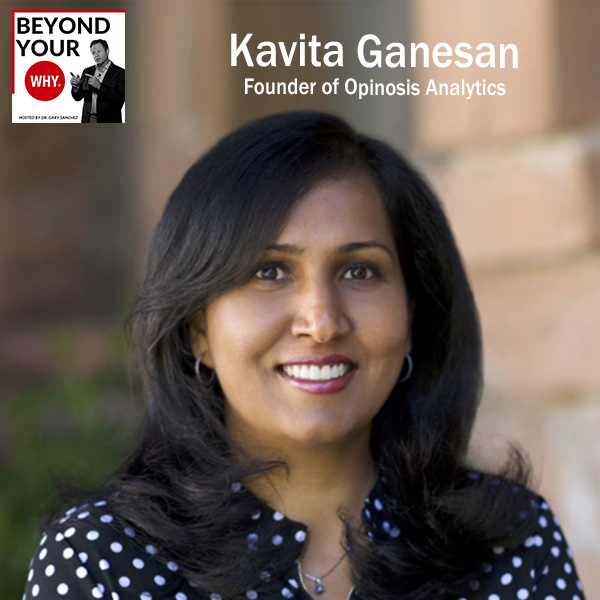
Are you someone who seeks to solve complex and challenging situations, even the problems of other people who view you as “smarty pants” or someone who doesn’t listen? Your WHY is of make sense! In this episode, Kavita Ganesan, the founder of Opinosis Analytics, shows how her WHY of make sense allows her to find solutions to AI problems that companies face. Kavita’s expertise demonstrates how AI functions in many businesses growth. Cultivate your passion for making sense of complex situations by tuning in to this episode today.
—
Watch the episode here
Listen to the podcast here
The WHY Of Make Sense In Analytics With Kavita Ganesan, Opinosis Analytics
In this episode, we’re going to be talking about the Why of Make Sense, to make sense of the complex and challenging. If this is your why, then you are driven to solve problems and resolve challenging or complex situations. You have an uncanny ability to take in lots of data and information. You tend to observe situations and circumstances around you and sort through them quickly to create solutions that are sensible and easy to implement.
Often, you are viewed as an expert because of your unique ability to find solutions quickly. You also have a gift for articulating solutions and summarizing them clearly in understandable language. You believe that many people are stuck and that if they could make sense of their situation, they could develop simple solutions and move forward. In essence, you help people get unstuck and move forward.
I’ve got a fascinating guest for you. Her name is Kavita Ganesan. She is an AI advisor, strategist, educator and Founder of Opinosis Analytics. She works with senior management and teams across the enterprise to help them get results from AI. With many years of experience, Kavita has scaled and delivered multiple successful AI initiatives for Fortune 500 companies, as well as smaller organizations.
She has also helped leaders and practitioners around the world through her blog posts, coaching sessions and open-source tools. She holds degrees from prestigious computer science programs, specifically a Master’s degree from the University of Southern California and a PhD from the University of Illinois at Urbana-Champaign with a specialization in applied AI, NLP, Search Technologies and Machine Learning. Kavita has been featured by numerous media outlets including Forbes, CEOWorld, CMSWire, Verizon, SDTimes, Techopedia and Ted Magazine. Kavita, welcome to the show.
Gary, thank you for having me. I am very excited to be talking to you.
Where are you? What part of the country are you in?
I’m in Salt Lake City, Utah. That’s where I am.
Where were you born? What was you like growing up?
I was born in Malaysia. That is South of Thailand and North of Singapore. It is part of Southeast Asia. That’s where I grew up. I came to the US when I was around twenty years old. I was a very quiet individual, observant and reserved but very sharp and smart in academics. I did well in school. After my Bachelor’s degree in Computer Science, which I did well in, I got admission to the University of Southern California in Los Angeles. That’s where I did my Master’s and that’s where I got introduced to this whole world of AI.
I was taken up by the complexity of AI as well as the opportunities that it presents for each new problem. I love problem-solving and algorithm development. AI is a combination of the two. That’s how I got into it. Even back in 2005, they had cutting-edge AI research going on and this was long before AI became the mainstream topic that it is now. At that time, there were no jobs in AI so I went and worked at eBay as a software engineer but I was still very intrigued by AI. I was still attending conferences related to AI. I was publishing papers.
I was still doing AI on the side and I wanted to get deep into AI. I said, “The heck with this job. Whether there are jobs or not, I’m going to do a PhD in AI.” At that time, I was ready to become either a research scientist because that’s where people with AI backgrounds go or an academic professor. I wanted to be a research scientist so I could stay within industry jobs. I had a blast and people think I’m crazy leaving a high-paying job and becoming a graduate student earning only $1,800 a month but I’m okay with that for a while.
Let’s go back a little bit. In high school, you were quiet but interested in problem-solving and learning.
I was interested in learning. I was a good student.
For those that are reading, Kavita’s why is to make sense of the complex and challenging. Her how, how she does that is by seeking mastery, diving in deep, learning all the nuances and learning as much as she can. Also, her what, ultimately, what she brings is a trusted relationship, to be that trusted source. Let’s see how this plays out for her. Your Bachelor’s degree was where? Was that in Malaysia?
It was in Malaysia at a public university. I was good at programming. I did a Computer Science degree and I excelled at it because it came very naturally to me. There was a lot of algorithm development and problem-solving.
You then went to USC, which is where I went. I went to USC as well. Your story sounds very familiar to me because when I went to USC, there was no such thing as cosmetic dentistry at that time but USC was on the cutting edge of all of that. They were the first ones to come up with a dentistry degree, which is what when I was there but similar to AI when you were there. Tell everybody what is AI.
AI is a very specialized software automation that helps you mimic human-like thinking and decision-making problems. Let’s say a doctor uses his years of experience to decide if a patient has lung cancer based on the patient’s data, his experience, his training and a range of other factors like images from their scans and stuff like that. AI tries to replicate this by learning from historical data points. When a patient comes along, it looks at their data and then makes predictions. “This patient may have a high risk of lung cancer.” It’s replicating how humans think and reason. That’s what AI is.

How does it do that? How does it learn? What the heck is it? Where is it? I’ve been using some AI stuff, the ChatGPT. Where is it? What is it? Is it one computer? How does this happen?
It’s algorithms behind the scenes. There are thousands of different algorithms and the way it learns is based on seeing examples in data. I’ve seen thousands of different patients with lung cancer and also thousands of different patients without lung cancer. By mining the patterns with patients with lung cancer and without lung cancer, I know what the underlying factors are that result in a patient having a high risk of lung cancer.
It learns based on the patterns that it sees from there. That’s why data is a very important piece of AI systems. It’s the same thing with ChatGPT. The reason it’s able to generate text that’s so accurate is that it’s seen all this data across the web. It’s putting together words and concepts that answer what you are looking for and generating that with a certain degree of certainty.
[bctt tweet=”AI learns based on the patterns that it sees from data. So that’s why data is an important piece of AI systems today.” username=”whyinstitute”]
It’s not 100% sure what it’s generating but it generates a probability along with the answers. That’s how it works. By looking at data and the different algorithms to learn from that data and what probabilities to compute, what mathematical functions to use and how to generate that data for you, the answers for you.
How does a computer learn?
In statistics, you try to fit a function to data. That’s what it’s trying to do but this function may not be linear. It might be something complex like it is in our brains. We don’t know how we arrive at certain answers but we get to the answer. That’s how it’s learning. It’s creating this internal complex function that helps it make predictions. That’s essentially what it’s doing.
If I gave it 2 plus 2 equals 4, where does it store that? How does it keep track of that? It is like saying, “2 plus 2 equals 4. I’m going to stick that over here. In case I ever get asked 2 plus 2 again, I’ll know where that is and I can spit out the answer.” It seems that somebody or something has to be orchestrating it in the background. Is that not true?
That is true but the thing that’s orchestrating it is the underlying computing unit. Mathematical operations are already supported by computers. Those basic operations like addition or multiplication are already supported. It uses the memory that the computer has to store information and retrieve its data. All that is already there. What AI brings to the table is how we use all these numbers in a way that will generate the answers for the end user. That’s where the function comes in. AI creates this complex function using all those numbers that computers can already generate and compute and spits out the answers for you.
It’s still confusing and I bet it’s still confusing to the people reading. I was a Computer Science major in college and I still don’t get it. Let’s go back to you. You got your PhD in AI. Where did you go from there?
As I was about to graduate in 2013, I was ready to become either a research scientist or an academic research professor but that’s the time that big data science AI started to take off in the industry. Instead of doing all the research stuff, I went on to solving industry problems. I worked at different companies like 3M and GitHub. I solved some of the AI problems at those companies. As I was doing that, I was also getting requests from other companies on a consulting basis to help them implement AI in their organizations.
That’s how I morphed into more being a consultant. I found that a lot more rewarding because I got to learn different domains and problems and I got to impact problems so there was less bureaucracy and politics. I got to work on the AI side of things. That interested me. In 2020, I said, “I’m not going to do employment anymore. I’m going to go full swing into consulting.” That’s how I wrote my book. That’s how I started speaking and a lot more consulting. I like it because it’s an intersection of what I am. It’s problem-solving AI and making the complex simple for the customers.
You said you went in and solved AI problems. What would be an example of an AI problem? I’m still struggling a little bit to understand. Since I’ve used some AI, I get what I can do with it but what would be an AI problem that a company would have?
A very common one is the recommendation systems that you see on Amazon. That’s essentially an AI problem. It understands your browsing history and what you like and then it makes recommendations on what you might buy. It could be books or electronics. It’s trying to understand the customer’s taste and predict what they may buy so it increases revenues for them. One of the problems I worked on was like that. Not in a monetary way but more for discovery and engagement. Its recommendations are to increase discovery and engagement. Another problem was trying to generate billing codes. Have you heard of the ICD-9 and ICD-10 billing codes?
No.
That’s how insurance bills get reimbursed by insurance companies through these codes but a medical coder has to read lots and lots of documentation to get to those codes. I developed AI systems to automatically generate those codes by looking at the data. The medical coder only has to verify, “This one looks right. This one doesn’t.” You’re improving their productivity. Those were the types of problems I worked on, the healthcare side, code side and recommendations. These were the problems.
Is AI something that’s already out there that anybody can use? How do you go about building something like that? If I were to hire you and say, “I want to figure out what people might want to buy on top of what they’ve already bought or purchased,” how do you solve that? How do you create that? What do you have to create?
There are different types of AI systems. There’s AI to understand natural language and images. There’s AI to make predictions. Self-driving cars use a branch of AI called computer vision to help them see where it’s going and how it’s moving. That’s how it avoids obstacles. It’s constantly processing images, detecting objects and making decisions. It depends on the problem. For most problems, we have the tools to solve them using AI but your problem may be very futuristic. You wanted it to think just like you. That type of AI is not there yet. Although ChatGPT seems like it’s there, it’s stringing together text that it already knows so it’s not thinking like you.
I probably already know the answer to this but does AI excite you or scare you?
AI excites me, especially from a business perspective. Businesses have barely scraped the surface of using AI within their business. There are a lot of opportunities for solving productivity-related problems, revenue-related issues or human error-related issues using AI. I see a lot of opportunities and that excites me. It doesn’t scare me at all because AI systems are not humans. We still need humans to do a lot of the other tasks. It’s going to make us more efficient and it’s going to be helpful but I don’t think it can do what we do as a whole.
[bctt tweet=”AI systems are not humans. We still need humans to do a lot of the other tasks. It’s going to make us more efficient.” username=”whyinstitute”]
When will it be able to do what we can do?
There is a prediction that it’s in 75 years but we’ll have to see.
When I started, I didn’t know much about ChatGPT and then I started to play with it. I was at this event and they were talking all about it. I’ve since shown it to some other friends and other people. The first thing I hear is, “That scares the heck out of me.” Everybody seems scared of it because maybe it’s unknown or maybe because of what it can do and whom it’s going to replace. It seems like it’s going to replace so many people.
Tools like ChatGPT have no regulation. People can use it in any way they want. They can use it for disinformation campaigns and plagiarize other people’s content. That’s the problem with ChatGPT. It’s open-ended so you can do anything with it. This is mainly scaring the marketers and people who are on the creative end.
It seems like you can get it to create slides for you. There are so many things it’ll do for you better than you can do it and for free.
Yes, free to a certain extent. You still need to pay for the API usage.
I fed into it an introduction to introduce somebody, “Make this more compelling.” In two seconds, it created something that might have taken me a couple of days to do and redo. It was very good. I was amazed at how good it was. I saw a guy give a whole speech and he started it with a poem. He told everybody that he had been learning poetry. Of course, he hadn’t been. He asked ChatGPT to create a poem for him. His whole presentation was using artificial intelligence. It was fascinating.
Marketers are afraid but they still need to add a layer to check the facts within whatever article it produces. Make sure it’s not plagiarizing content word for word. There are a lot of problems with text generation, I feel.
What do you see as some of the innovations that are coming in the near future? What are you seeing happening and maybe that you’re going to be even part of?
There’ll be more prompt-based automation where you give some text to specify in the form of audio. You say what you want to be done in a series of steps and the AI understands what you want and goes and does it like, “Schedule my newsletter, then create a short email that says something and then track the analytics.” That type of automation is on the horizon or might already be there but that’s going to help us as business owners and entrepreneurs.
It feels like the skill involved in being better than your competitors is going to go away because everyone’s going to have access to everything at the same level. There won’t be a way to determine who does what better because everyone’s going to have the same thing.
We all have access to the same tools. Where you are going to stand out is in how we deliver the service or maybe in the knowledge that we have.
We’ll then have robots in automation that will be delivering everything. That’ll be standardized. I guess it’s a good thing but it does take the human element out of it.
It depends on the type of automation. Even for marketing campaigns, you still need a human to oversee the ads that it generates and make sure the facts are correct. You still need a fact-checker and all those roles. Maybe we will transition from being writers to actual fact-checkers and proofreaders. It’s providing high-level guidance to these AI systems.
I remember reading an article where somebody said that when the telephone came out, there were so many people predicting the end of humans or the end of communication, the end of this or doomsday. Everything’s going to fall apart. It didn’t but that was all the predictors. You hear the same thing now about AI.
The nature of your job will change as a marketer or as an SEO person. Even a physician may be able to use ChatGPT to see what the available options treatment options are. The nature of your work will change.
I had a crazy thing happen to me where I was in the hospital for nine days. I can’t tell you how many times I saw the nurses and even the doctors googling my symptoms or what was going on or what we should do.
They’re already doing it. ChatGPT makes it easier.
The last question for you, Kavita. What’s the best piece of advice that you’ve ever been given or the best piece of advice that you’ve ever given?
“The impossible is often untried,” is something I learn from my dad. If you don’t try things, you’ll never know what’s possible, which is how I’ve lived my adult life. Even though people think I’m crazy, I’m quitting my job and doing consulting, I did it because I don’t know what I’ll miss if I don’t do it. Taking those unnatural parts has been rewarding to me.

I’m sure it was scary along the way.
It’s scary. It still is but I’m slowly learning how to navigate this whole entrepreneurship in combination with my technical skills. It’s a steep learning curve. If you’re willing to take the risk, the rewards are high.
What’s next on your path?
I feel like I’m still new in my consulting work so to grow that and do more corporate training at the executive level because that’s where the misunderstanding of what AI is and what it can and cannot do exists. Unless they understand AI and see where they can use it, their business is not going to get into AI the way they should. Unless I change my thinking at that level, I don’t think there’ll be enough progress. I have a big vision to change the thinking of executives when it comes to AI.
If there are people that are listening and want to get ahold of you, follow you and learn more about you, what’s the best way for them to connect with you?
They can visit my website to start to learn about what I do and how I do it and the things I talk about. You’ll also get three free chapters of my book on my website. My book is very high level so anyone can read it and get value from it. If you want to follow me on social media, I’m mostly there on LinkedIn. My website is KavitaGanesan.com and @KavitaGanesan is my handle.
Who would be your ideal client? Who would find the most value in connecting with you?
Data science, team leaders and IT leaders of technology. Those are the types of people I usually work with.
Kavita, thank you so much for being here with us in this episode. I thoroughly enjoyed it. I’m fascinated by AI. I am scared to death of it still probably but I do appreciate you being here to enlighten us with a little bit more about what it is.
Thank you so much, Gary.
—
It’s time for our new segment which is Guess Their Why. In this episode, I want to use the quarterback for the Cincinnati Bengals, Joe Burrow. Hopefully, you watch sports and you’ve seen that the quarterback for the Cincinnati Bengals who have had the worst team for many years has turned it around. Joe Burrow was a quarterback in college who was supposedly not good enough for his team. I think it was Ohio State.
He transferred to LSU and had what’s arguably the best college football season ever at LSU. He was then drafted into the NFL by the Cincinnati Bengals and he was the number one pick. That tells you how bad the Cincinnati Bengals were because the worst team gets to pick the best player. He turned a franchise that has been a perennial loser into a winning franchise. They were in the Super Bowl in 2022. They almost made the Super Bowl in 2023 and so much of that can go back to Joe Burrow and his ability to bring his team forward.
If I were to guess at his why, I would guess that his why is trust, to create relationships based upon trust, be the trusted source and be the one that others can count on. He’s the guy that everybody counts on and he loves that they count on him. He doesn’t necessarily look for the limelight but he gets it. If you see him on the sideline, he’s not the guy screaming and yelling at everybody’s face. He’s not the one that’s trying to say, “Look at me.” He’s not the one that beats his chest when he does something good. He just goes about his business and he’s very professional. He’s somebody that his team can count on and he’s very precise.
I believe that his why is to create relationships based upon trust. What do you think? If you know who Joe Burrow is, let me know what you think about his why. Thank you for reading. If you’ve not yet discovered your why, you can do so at WhyInstitute.com with the code, PODCAST50, and get it at half price. If you love the show, please don’t forget to subscribe below and leave a review or a rating on whatever platform you use. Thanks very much. I will see you next time.
Important Links
- Opinosis Analytics
- ChatGPT
- LinkedIn – Kavita Ganesan
- KavitaGanesan.com
- @KavitaGanesan – Twitter
- http://FreeChapters.AIBusinessCaseBook.com/
About Kavita Ganesan
 With over 15+ years of experience managing and scaling AI initiatives at Fortune 500 companies such as 3M and Microsoft, as well as smaller businesses, I have developed strong expertise in helping organizations reach their automation goals. I’ve taken multiple AI projects from a fuzzy idea through planning and implementation, delivering meaningful outcomes for these organizations.
With over 15+ years of experience managing and scaling AI initiatives at Fortune 500 companies such as 3M and Microsoft, as well as smaller businesses, I have developed strong expertise in helping organizations reach their automation goals. I’ve taken multiple AI projects from a fuzzy idea through planning and implementation, delivering meaningful outcomes for these organizations.
As an AI advisor and consultant, I work with senior leadership and execution teams to discover the best AI opportunities, strategize around their AI roadmap, develop a data strategy to enable AI and analytics, and oversee the implementation of AI initiatives. I also teach executives and managers about this fascinating world of AI and how to leverage and manage it for the best outcomes for their company.

